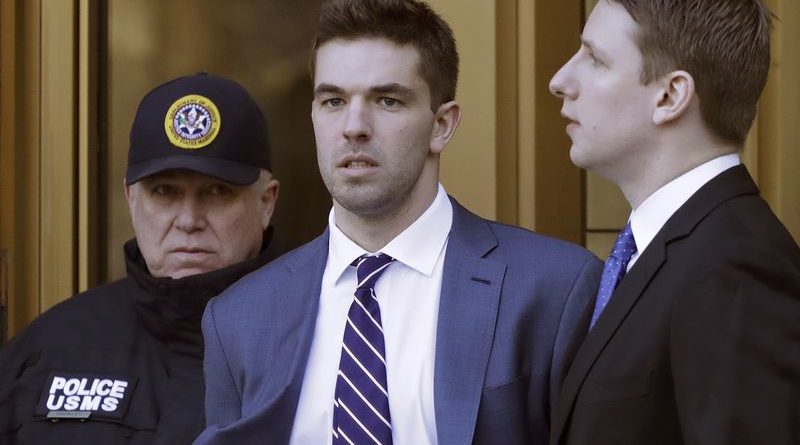Fyre Festival Fraudster Who Targeted Status Seekers Gets 6 Years

A New York man whose business ventures targeted wealthy, status-seeking millennials was sentenced to six years in prison for defrauding investors of $27.4 million in the disastrous 2017 Fyre Festival and then, while out on bail, running a separate concert-ticket scam.
Billy McFarland, 27, appeared with family members in a Manhattan courtroom on Thursday as U.S. District Judge Naomi Reice Buchwald delivered the sentence. He pleaded guilty in March and July to the separate scams, which the government said were orchestrated to help pay for an extravagant lifestyle.
“I can’t believe how wrong I was,” McFarland, wearing eyeglasses and a tan prison jumpsuit, told the judge before the sentence was handed down. “I can’t believe how stupid I was. I betrayed the trust of my investors, customers, family and the court. My mistakes were severe and they hurt a lot of people.”
McFarland, who read from a prepared statement, said the “extremely bitter reality” is that he’d squandered his privileged upbringing. He went on to describe the violence and intimidation he’s dealt with in jail awaiting sentencing, saying incarceration had given him a new perspective on life. Those remarks brought his family members to tears.
Randall Jackson, McFarland’s lawyer, largely blamed his client’s conduct on manic behavior stemming from an undiagnosed mental disorder and possible delusions of grandeur. His remarks were based on the findings of two paid professionals who examined the defendant and filed reports with the court.
But Buchwald slapped down those explanations, saying mental health issues aren’t an excuse for criminal conduct. McFarland’s other arguments for leniency, such as his prompt guilty pleas, were deemed “nonsense” and “laughable” by the judge. She mocked the defense’s portrayal of McFarland as a “well-intentioned, enthusiastic young man who got in over his head,” citing the expensive upgrades he made to his Manhattan apartment while the fraud was underway and the Maserati he paid to be driven around in.
“The portrait simply doesn’t fit the facts,” Buchwald said.
McFarland billed the festival in the Bahamas as a luxury music event. But he quickly became a pariah as thousands of would-be revelers, some of whom paid as much as $12,000 to attend, arrived on a remote island to find badly constructed tents, cold cheese sandwiches and a lack of proper bathrooms. The conditions went viral on Instagram.
Prosecutors had urged a combined sentence of 15 to 20 years, saying McFarland personally profited from fraud schemes that caused “substantial harm to many victims.”
“For the past five years, the defendant has been the consummate con artist,” prosecutors wrote in a sentencing memorandum to the judge. “He betrayed and deceived his investors, customers, and employees while he was living the high life at his luxury apartment, traveling to exclusive locales, staying at luxury hotels, being chauffeured in his Maserati, and entertaining himself and his friends at restaurants, bars, and casinos.”
Fyre Festival, the Coachella for the Super Rich, Ends in Disaster
McFarland admitted in March that he lied to investors who bought a $1.2 million stake in his company, Fyre Media Inc. Authorities said he provided false documents that inflated revenue and altered a stock-ownership statement to make it appear that shares he owned were worth $2.5 million when they were actually valued at less than $1,500.
The ruse allowed McFarland to convince investors he would personally guarantee their investments. Organizers borrowed as much as $7 million in a last-minute bid to fund the doomed festival.
“Whenever he needed more money, he lied to investors to get it,” prosecutors said. “Whenever he wanted more money, he gave it to himself from business accounts. Whenever one scheme began to falter, he hatched a newer and more elaborate one.”
In July, while he was out on bail, McFarland pleaded guilty to new charges that he ran a fraudulent ticket business called NYC VIP Access. Prosecutors said he took in more than $100,000 from at least 15 people for non-existent tickets to such events as the Met Gala, Coachella, Burning Man and the Super Bowl.
Quick Cash
The scheme was designed to generate cash quickly to preserve his extravagant lifestyle, the prosecutors said. “He found young and naive employees to interact with customers, accept ticket sale proceeds into their bank accounts, and provide McFarland with cash,” according to the prosecution memorandum.
The case is U.S. v. McFarland, 17-cr-00600, U.S. District Court, Southern District of New York (Manhattan).

